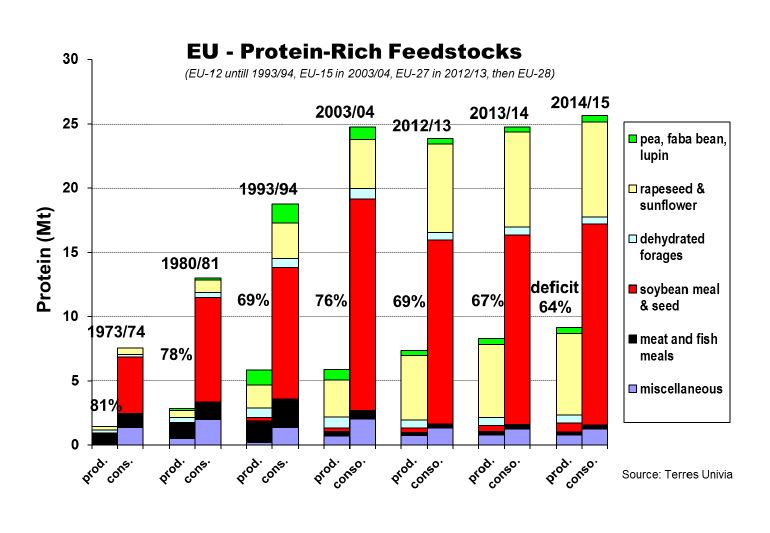Tori Morgan, NFU Combinable Crops Adviser, reports back from the Copa-Cogeca bioenergy working group, she writes:
Last week I attended the Copa-Cogeca bioenergy working group which focuses on non-food uses of crops – primarily biofuels. The European Commission are currently working on their plans for renewable energy policy post 2020 and although Brexit is on the horizon these proposals could have real impact on us in the UK as they seek to phase out crop based biofuels. Currently around 40% of our oilseed rape crop is destined for biodiesel production on the continent, so how these markets work really matters.
One of the main themes of the meeting was actually protein – or animal feed supply; did you also know that on average the EU imports up to 70% of its protein requirement? As the graph below demonstrates this is mainly soya based products which usually originate from South America.

The food vs fuel debate often muddies the water when it comes to biofuels, but actually they play an important role in tackling the protein deficit. When crop based biofuels are produced we get high protein animal feed as a co product.
For example take oilseed rape:
- When crushed it is around 41% oil and 59% protein (rape meal).
- In the UK and EU the increased demand for vegetable oil (due to biofuels) has meant the popularity of the crop has grown and these new markets have led to investment throughout the supply chain.
- As a result average yield has increased from 2.9t/ha in 2001 to 3.9t/ha in 2015.
- Ultimately this has improved self-sufficiency, in 2001 the EU was importing 77% of its OSR meal whilst in 2015 it only imported 67%.
World demand for protein is ever increasing as more of the global population get a taste for eating meal regularly, if we are to satisfy this craving a reliable and secure protein supply chain will be key.
If proposals to limit crop based biofuels are agreed we effectively limit the EU market for veg oil undoubtedly leading to ‘market readjustment’, this makes it difficult to see how the crop would make economic sense to grow – especially given the other challenges OSR growers face, not least the threat of cabbage steam flea beetle!
When you also consider all the biodiversity and rotational benefits OSR brings to UK farms you realise what could be at stake. This is why the NFU will continue to lobby with you and on your behalf against the phase out of crop based biofuels both at home and in Europe.
